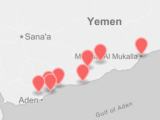Date: Thu, 11 Feb 2016 16:28:15 +0100
By Bill Roggio |
Al Qaeda in the Arabian Peninsula has expanded its footprint across southern Yemen by seizing five towns, including a provincial capital, over the past two weeks. Al Qaeda’s official branch in Yemen continues to capitalize on Yemen’s chaotic civil war.
AQAP took “full control” of Houta, the capital of Lahj province, on Jan. 26, according to Al-Araby al-Jadeed. Pro-government militias in the town fled as AQAP fighters were “storming the public institutions” and blew up a police station.
After overruning Houta, AQAP marched on four towns in the provinces of Abyan and Shabwa, traditional strongholds for the jihadist insurgent group. On Feb. 1, AQAP took Azzan in Shabwa without a fight.
Next to fall was Mahfid, a town in Abyan province, on Feb. 4, according to Al-Masdar Online. AQAP raised it’s black banner and set up security checkpoints throughout the town. Mahfid, like Azzan, was taken without opposition from security forces.
Additionally, AQAP recently took over the coastal towns of Shoqra and Ahwar in the Abyan province, according to a Feb. 8 report by AFP.
The five towns are the latest major population centers in southern Yemen to fall under al Qaeda’s sphere of influence. The first city to fall was Mukalla, the capital of Hadramout province, in April 2015. AQAP launched several high-profile assaults on Yemen military bases before capturing the provincial capital.
In December 2015, AQAP overran Zinjibar, the capital of Abyan province, and the nearby town of Jaar after clashes with Yemeni security forces.
In addition to the cities and towns known to be held by AQAP, the group also holds sway over rural areas in Abyan, Shabwa, and Hadramout provinces.
AQAP seeks to administer the territory it has recently seized, and is promoting its efforts on social media. Recently, AQAP has highlighted its efforts to provide services as well as put into effect sharia, or Islamic law, in Mukalla, Zinjibar, and Jaar. [See LWJ report, AQAP provides social services, implements sharia while advancing in southern Yemen.]
AQAP is retaking ground that was lost in 2012 after the Yemeni government, with US assistance, launched an offensive in southern Yemen. AQAP controlled most of southern Yemen, including Zinjibar and a number of towns in Abyan and Shabwa from May 2011 until the fall of 2012.
AQAP has taken advantage of Yemen’s chaotic civil war, which began in 2014 and is being fought between Shiite Houthi rebels and forces loyal to former president Ali Abdullah Saleh on one side, and deposed President Abd Rabbuh Mansur Hadi and a Saudi led coalition of Gulf nations on the other. While the pro-Hadi forces have battled to eject the Houthis from southern and central Yemen, AQAP has taken advantage of the turmoil and seized areas where Hadi’s forces are weak or non-existent.
Hadi’s forces have put up little opposition to AQAP and its political front, Ansar al Sharia, as the groups have also launched deadly attacks against the Houthis. The US has targeted AQAP leaders in drone strikes, and has killed some of the group’s top leaders, including its founder and first emir, Nasir al Wuyhashi. But the loss of senior leaders has not stopped AQAP from gaining ground in the south.
